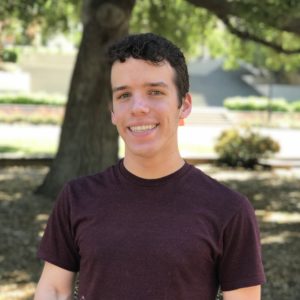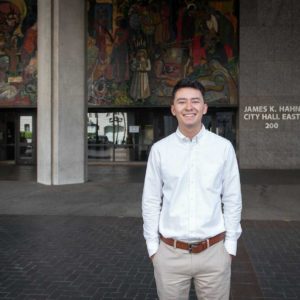Voting for Associated Students of Occidental College (ASOC) elections opened Wednesday, April 17 and will run until midnight Friday, April 19. Students can access their ballots through MyOxy in the “Student Elections” link under “My Gateway.” In addition to voting for ASOC president, class senators, vice president positions and honor board jurors, students will vote for or against proposed changes to the current constitution.
Twelve candidates are running for 15 open positions this election. Only two races have candidates running with opposition: ASOC president and sophomore class senator. The rest of the candidates are running unopposed, meaning they will be elected if at least one person votes for them. Due to a lack of candidates, there will be three vacancies on honor board and two vacancies for senior class senator.
The Occidental sat down with this semester’s candidates to ask them about their platforms and priorities for ASOC moving forward. Answers have been edited for length and clarity.
Ryan Lin — Candidate for ASOC President

Why are you running for President of ASOC?
“I really want to help the student body here and really increase engagement with the students. Currently, I serve as sophomore class senator and I’ve kind of developed new ways of engaging with the students … I want to restructure and redefine what ASOC does. That’s just one of the things I want to do as president. Of course, I also want to expand on the resources that students have and can’t use. One of the projects I’m working on currently as senator is gaining card access to Johnson and Fowler past typical hours because I know students typically want to use those as academic resources. But besides academic resources, also provid[ing] the financial help and resources for clubs on campus and student activism groups.”
Do you plan on incorporating ASOC’s direct action committee’s demands in your presidency if you’re elected, and if so, how would you do that?
“I think it’s very important that ASOC helps to incorporate them and also takes hold and keeps it going in the narrative of it. I think this is a very pivotal moment in our college, of course, and I think it shouldn’t stop as soon as the seniors of our group in ASOC [leave], like Jacques [Lesure], who has kind of taken the command of this as a whole and I think we need to continue this narrative and continue the discussion of renaming the pool, and I think we need to provide an access where students can engage with the faculty and the administration so we can act as that bridge. So, for example, we need to provide a seat at that table for BSA [Black Students Association] when they’re discussing the new CDO [Chief Diversity Officer], because I know Rhonda Brown is resigning. … Whether it be the faculty contacting the students or students wanting to contact the administration, we need to provide that bridge and that answer, basically keep this thing going.”
What do you think ASOC needs to prioritize in the coming semester and moving forward?
“I think we need to keep our ears open and really hear their concerns, especially because this is such a important time of our college history. And we really need to keep all the voices and opinions heard and advocate for shared governance around all branches and restructuring ASOC and we need to reallocate resources to groups that are typically marginalized. I think there’s a clear path that we need to support different cultural groups, whether it be BSA, or [Sexuality and Gender Acceptance Club] SAGA. Any way ASOC can help these communities and provide them a voice. I think it’s important.”
What would you say are your top three priorities of actions you’re going to take as president?
“So my three top priorities would be obviously restructuring ASOC and holding [them accountable]. Noah [Schucking] was the chief [of staff], and he was doing these evaluation reports, holding ASOC officers accountable. He set up goals to see if they’re reaching their goals and I think that’s something that we need to keep doing. Advocating for shared governance around all branches is another point, and really communicating with the Dean of the College — asking what the students want and continuing the conversation about Black Studies, and really engaging with the student clubs and other community groups and providing them a seat at the table, at the conversation, such as BSA. I think we really need to stay in contact with each group so we can advocate for what they want, and provide them resources whether it be academic or financial.”
Nina Srdić Hadži-Nešić — Candidate for ASOC President

Why are you running for President of ASOC?
“I’m running for ASOC president because there are ways the institution can do more to center and support students of marginalized identities. And after a year spent on Diversity and Equity Board, I realized it would be best for not only one branch — them — to shoulder these efforts of diversity and equity, but for all of ASOC to have that framework and to really focus on supporting all students but center [the] most marginalized. I also identify the need to afford ASOC to have a more horizontal leadership, so that all branches have equal power and equal decision making as opposed to just Senate having most of the power — to have that leadership be more equitable. Additionally, I would like to increase Senate’s responsibilities in order to serve students better. Specifically, this horizontal leadership is important because ASOC has $800,000 of unspent student fees that are just sitting there with no future use in mind, and those should go back into the student body. So it’s really important that we can tap into them and invest in students and invest in their projects. Additionally there are big decisions at the college coming up, such as picking the new [college] president, picking the new Chief Diversity Officer, as well as the other high level administrative decisions that I think students really need to be part of. So I would like to continue the current [ASOC] president’s effort of shared governance and really holding admin accountable.”
Do you plan on incorporating ASOC’s direct action committee’s demands if you are elected, and if so, how would you do that?
“Yes, ASOC’s direct action committee’s demands are already part of my platform. That’s a big part of my overarching goals, achieving diversity and equity and holding administration accountable. So I would definitely love to follow up with administration and see, before and when we are back in the fall, how far they’ve progressed and whether they’re fulfilling all the demands they promised. And I would also love to follow up with the students who made those demands, to hear their part of the story and to hear how I can best serve them as their representative.”
What do you think ASOC needs to prioritize moving forward next semester and beyond?
“Beyond supporting most marginalized students, I think ASOC needs to prioritize bridging the gap between student organizing and student government and supporting students’ organizing efforts more through funding, through collaboration, perhaps by having that Direct Action Committee become a permanent place where student organizers can collaborate and connect, share ideas, work on projects together with each other, but also with ASOC representatives who care about these social justice issues.”
Is there anything else you want students to know about you, or about your platform or what you would do as president?
“I would say that it’s really important for students to know that I’m running to continue the efforts of shared governance, and build on those efforts and ensure that students are included in all of the decision-making by administration, because those decisions directly influence us. And I want to make sure that the students have a foot in the door, and not just ASOC representatives. The goal is to keep doing direct task forces that Jacques [Lesure], the current ASOC president, started. And those task forces are on different issues that need to be solved but include ASOC representatives as well as administration but most importantly, students who are directly affected by those issues and student organizers who organize around those issues, and I think such efforts really need to be continued in the next academic year.”
Collin Nascimento — Candidate for Sophomore Class Senator

Why are you running for sophomore class senator?
“Over the past year, I’ve been very observant with ASOC events and things they’ve been doing and other student organizations as well. And I thought that with a little more education on my part, I could be perfect to fill that role and be that role model for other people.”
Why should students care about ASOC and what it does?
“ASOC is really the center of student government. They take concerns, they address those concerns, and they try and oftentimes execute action for them. Really, anything that students do can be traced back to something ASOC does: funding events, funding the newspaper, KOXY, or many other student events are all funded at their discretion. It’s so important and a lot of people don’t really know a lot about it. Everyone pays a fee at the beginning of the school year and oftentimes, it just goes ‘poof,’ no one asks questions about where it is. We’re those people, we need to take it responsibly and so should the student body.”
Luca Van der Meer — Candidate for Sophomore Class Senator

Why are you running for sophomore class senator?
“I spent a long time this semester especially working in and around the college doing different jobs. I’m working with [the] admissions office, I’m a PA [programming assistant] at SLICE, and I also did the musical this semester, which is a whole lot of fun. So, a lot of that sort of culminated in me saying, ‘Wow, I love the school so much,’ but not really getting a chance to express myself in the way I would like to in the student body. I want to get back into the political process and get involved and really do what I can to help out … So I want to create a space for those people to voice their concerns if they don’t want to go to town halls, or if they don’t want to engage in activist conversation the same way … your average student at the college would, but they still want to engage and promote their ideas. So I want to create inclusive office spaces and a campus community that’s more welcoming to everybody.”
Why should students care about ASOC?
“Well, first of all, they’re paying to care about ASOC. I don’t know why you would not care about where your money’s going. But also, ASOC provides so many cool resources in terms of clubs, community engagement, and serves as the representative to the greater school. They are here for an education, they’re getting something out of spending their time at Oxy, so to maximize the potential that the institution provides, they have to be engaged and challenge what is said from higher bureaucrats about them because they’re paying a lot of money to come here and get an education, so they may as well make it as best they can. And I think rallying under the collective student body is the best way to do that — we see that all the time. That’s what ASOC does: providing so many resources and just an area of representation because without that, what are we going to do?”
Benjamin Ventresca — Candidate for Sophomore Class Senator

Why are you running for Sophomore Class Senator?
“There’s not one big reason, it’s a lot of small reasons. The first is my friend Julia [Eubanks] ran first semester, and she feels like she’s been able to make a lot of positive impact on the school … you can tell watching her that she’s having a good time doing it. And then a lot of her ideas are really making an impact. So that’s the first reason, that I’ve seen it be really influential in other people’s lives, and it’s something that I think I would enjoy. And then also Occidental’s just kind of been a part of my life. I grew up around here. So I’ve been coming to the campus since I was little. And like having the opportunity to do something to improve it seems like a worthwhile thing to do.”
Why do you think ASOC is important and why do you think that students should care about what ASOC is doing?
“I’m actually running in [one of two races] that has opposition, which is a good sign. It means the rising freshman class is hopefully more passionate, we have more people that are involved, you have already a rising sophomore [who] is going to be VP of [external affairs], and then we have three other people run out from positions. So I think that’s a good sign for where the school is going. But aside from that, I think the reason that a lot of the time, people don’t view it as important is because it’s behind the scenes, and you don’t see a lot of what’s going on, and then it doesn’t get a lot of acknowledgement for everything they do for the school. I work in the finance office, and just being there I’m privy to a wide array of seeing everything they’re responsible for funding-wise and making sure [everything] runs smoothly around campus. So I don’t think the issue is that Senate isn’t doing anything, I think it’s that they don’t always get the credit they deserve. And that’s just an issue of students having better things to do. So it’s a difficult issue to deal with. But I think the main objective will be to make sure people see what Senate’s doing, not necessarily change something Senate’s doing right now.”
Jagmit Dhami — Candidate for VP of Academic Affairs (Unopposed)

Why are you running for VP of Academic Affairs?
“I was the academic liaison on DEB when I was a sophomore. I feel like I have a lot of knowledge about what structures I need to be working with to further academic issues surrounding students. One of those was the MSI program and I still feel like there’s a lot to do with MSI in order to get student input. There have been committees and everything, but it should be more intentional. I think academics within the core program will be undergoing a lot of changes and that needs to be transparent to the student body as well.”
Why should students care about ASOC?
“It’s important to go through your student representatives because we do have an avenue. Even though it takes a long time, there is an avenue through which your problems can be solved and it can benefit a whole community. I think that’s what’s so important about ASOC, too, is to build that community of reciprocal relationships not between one another, but also between different levels of this institution.”
Julia Eubanks — Candidate for VP of External Affairs (Unopposed)*

Why are you running for VP of External Affairs?
“I am running for VP of external because I think it’s almost like being a senator on a bigger scale. You’re really working between the students and the administration, almost like a PR representative for ASOC. I think that’s something I’m really good at, is connecting with people and getting out there.”
What do you see being the primary issues of concern for ASOC next year?
“I think two things are going to be the big focus of next year. [First,] the Presidential Search Committee. That’s something that’s super important. Having someone that’s going to be representative of your whole school, and someone that’s going to be fitting the student body needs. So we’re starting the Presidential Search Committee and as VP of External, [I’ll be] putting on town halls to try to recruit people to that, to get their input so it can be really on this committee. And then secondly, I think that would also we saw the [creation of] the Direct Action Committee. And I think that that’s going to be instrumental because I think the students are excited to have something that comes from Senate that’s going to specifically address concerns of racism that we’ve seen.”
*Julia Eubanks is a staff writer for The Occidental.
Jordan Walker — Candidate for VP of Financial Affairs (Unopposed)

Why are you running for VP of Financial Affairs?
“Because I think the budget … can certainly serve students a lot better, particularly for individual projects … I thought that this would be the best way to have my own say in the budget and create one that better serves what students are asking for.”
What do you see being the primary issues of concern for ASOC next year?
“I think certainly selecting the 16th president, for me, is the important thing, and I think ASOC certainly has to be out in front of that, ensuring that our students are getting the resources they need both for students and from administrators. I think ensuring that the queer, trans people of color community is also served is so important. The queer lounge, currently in Pauley, is being renovated. Ensuring that that student feedback is incorporated into that space and seeing how ASOC can offer any support whether it be financial or liaison support. And I think another thing is just ensuring that the major of black studies gets the time that it was supposed to have had.”
Wafa Abedin — Candidate for VP of Internal Affairs (Unopposed)

Why are you running for VP of Internal Affairs?
“I’m currently vice president of internal affairs and over the course of the year, I’ve been working on amending the constitution to sort of outline the processes that ASOC always operated by, but they’ve never been written down. One of the big things we did was create a mission for ASOC, so that each branch would have a purpose that serves to achieve that big-picture goal. It started last year when I was first year senator and it didn’t pass … I wanted to continue it so I ran for vice president of internal affairs. I’ve spent this entire year doing what I wanted to do with the constitution.(…) In doing this, I realized that there are a lot of subsequent changes that are going to have to happen within ASOC and within branches, bylaws and drafting new documents that need like the provisions that we want in the constitution. So I feel that I would have sort of the best knowledge in terms of continuity and understanding the intention of the changes. So I’m mostly running because I don’t want to leave this job when I feel like things aren’t finished yet. I want to see it all the way through.”
What do you see being the primary issues of concern for ASOC next year?
“I think things like the resignation of Rhonda Brown, black studies being in jeopardy, the demands of the Direct Action Committee, definitely shows that there’s a lot of work in progress to be made around issues of diversity, specifically relating to the college’s history with anti-blackness, that we’re going to have to be cognizant of.
Sarah Gooderham — Candidate for Junior Class Senator (Unopposed)

Why are you running for junior class senator?
“After I came back from campaign semester, I started to realize how much of a gap there is between electoral politics and that kind of institutional power versus community organizing, which is what I’ve been doing. And I felt like, ‘Why wouldn’t I run?’ Because I have this experience and I don’t see a lot of people, especially in Senate, who have grassroots organizing experience and I just thought, ‘I could be that person to bring that voice to Senate.’”
What do you think ASOC needs to prioritize in the upcoming semester and year?
“Well, in the upcoming year, there’s two big things happening. The new president is being chosen, and, also, I imagine, the search for the new Chief Diversity Officer is going to be happening. ASOC, I think, has a really important role in amplifying the voice of the students, especially Senate — as a representative body of the students — has a very important role as a direct or somewhat more direct line to the administration than just regular students to make sure that we’re holding the school accountable to things that it has already promised and also, things that we would like to see happen.”
Noah Schucking — Candidate for Junior Class Senator (Unopposed)

Why are you running for Junior Class Senator?
“I’m running for junior class center because I was ASOC Senate’s Chief of Staff this year, and having come in because I wanted to work with Jacques Lesure and working on promoting shared governance at the school, I saw great potential in being a part student government. Having been on one year, I see that there’s still a lot of work left undone. I’m extremely proud of what Jacques has accomplished this year, in terms of shared governance … and I want to continue that trend.”
What do you see being the primary issues of concern for ASOC next year?
“I want it centered around three main administrative issues. I want to make sure that we as ASOC support the two student representatives on the presidential search committee as much as possible, so that they can connect to the student body and advocate for student interests when it comes to deciding on a new president. I want to do the same when it comes to the search for a new CDO. Now that Rhonda Brown has resigned, I want students to have the opportunity to be able to voice what kind of CDO they want for their Oxy experience. I want to make sure that we as student government leaders uplift student voices, but also advocate for it. It is not simple, it’s not easy just to say, ‘We want this.’ We have to actually fight for it.”
Phillip Wong — Candidate for Honor Board (Unopposed)
Wong is currently studying abroad and was interviewed via email.

Why are you running for Honor Board?
“I’m running for Honor Board because I served on it last semester before going abroad and would love to rejoin the branch. Honor Board is an important, but often overlooked, component of Oxy’s student government because it provides a platform for students to be heard by a group of their peers. Serving as a juror would allow me to get more involved in helping to facilitate a broader role for Honor Board on campus and to engage with more members of the community.”
How do you intend to overcome the obstacles that have faced Honor Board in the past?
“Honor Board has definitely struggled with vacancies in the past, but I think that comes down to Honor Board being an overlooked and misunderstood branch of ASOC. ASOC is usually considered with a select few roles and Honor Board is, unfortunately, not always included in those. Working to address this through more interactive endeavors like tabling on the quad or more collaboration with other branches of ASOC is a way to spread awareness of Honor Board and the role it plays on campus.”
![]()































